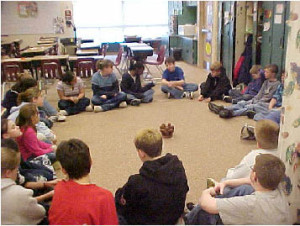News & Announcements
- Details
- Written by Joshua Wachtel
 Here's a followup to last week's news that a 9-year-old boy was suspended for calling his teacher "cute." From a blog post at Education News which has all the details (click here):
Here's a followup to last week's news that a 9-year-old boy was suspended for calling his teacher "cute." From a blog post at Education News which has all the details (click here):
[A]fter a district investigation, officials have found that Emanyea [the boy] did nothing wrong. The school board then gave principal Jerry Bostic the option to resign or have his contract terminated.
Bostic, who had been working for 44 years, said:
"I didn’t show a history of making problems like that. I’ve had the best of evaluations my entire career and because of some syndicated columnist in New York or California, I don’t have a job. ...
"I admit I made some errors in what I did, but to fire me or to demote me with 44 years in it, it just doesn’t make sense. ..."
- Details
- Written by Joshua Wachtel
 Congratulations to IIRP alumna Mary Ellen Mannix, for her recent online radio interview, in which she explains James's Project – jamessproject.com. According to the web site, Mannix's son "James was diagnosed prenatally with a minor congenital heart defect. Despite this advantage he lost his life at eleven days of age due to a variety of preventable medical errors and poor communication in his medical care."
Congratulations to IIRP alumna Mary Ellen Mannix, for her recent online radio interview, in which she explains James's Project – jamessproject.com. According to the web site, Mannix's son "James was diagnosed prenatally with a minor congenital heart defect. Despite this advantage he lost his life at eleven days of age due to a variety of preventable medical errors and poor communication in his medical care."
Now Mannix has launched James's Project, the mission of which "is to find, support and help work that protects infants in their first year of life. James’s Project aims to reduce infant mortality by focusing on patient safety isssues that affect the start of life. Our tools are education, communication and collaboration." ... "Creating effective communication strategies and opportunities in healthcare is critical to improving the system. It can help save lives. James’s Project safe guards the physical, emotional, and familial growth during the first year."
- Details
- Written by Joshua Wachtel
 “Before we had circles we didn’t feel like our voices mattered. Now the violence and fighting have stopped. We all come together. A lot of us want to change the world.” —A 15-year-old Bengali girl at Hamtramck High School, in Hamtramck, Michigan, USA
“Before we had circles we didn’t feel like our voices mattered. Now the violence and fighting have stopped. We all come together. A lot of us want to change the world.” —A 15-year-old Bengali girl at Hamtramck High School, in Hamtramck, Michigan, USA
The above is from a student interview in a new article, "Restorative Practices: Giving Everyone a Voice to Create Safer, Saner School Communities," by Laura Mirsky, in the new issue of The Prevention Researcher, a quarterly US journal that focuses on successful adolescent development and serves professionals who work with young people.
- Details
- Written by Joshua Wachtel
This piece struck me as interesting because it specifically discusses the possibility of using restorative justice to resolve juvenile hate crimes. It even quotes a youth who specifically says he would have liked to have talked with the offender to get questions answered and to correct misinformation. Are criminal justice systems truly listening to the voices and needs of victims?
On Monday, celebrity chef, Tony Singh was in Leith - one of the most culturally diverse areas of the capital - to support the juvenile hate crime scheme that aims to stamp out crimes motivated by prejudice against race, disability, religion or belief, sexual orientation and transgender people.
- Details
- Written by Joshua Wachtel
 Here are a list of films related to Restorative Justice, compiled by Kris Vanspauwen from suggestions made on the Restorative Justice International (RJI) LinkedIn group, that contributors thought would be useful to show to prisoners and inform them about the meaning of RJ:
Here are a list of films related to Restorative Justice, compiled by Kris Vanspauwen from suggestions made on the Restorative Justice International (RJI) LinkedIn group, that contributors thought would be useful to show to prisoners and inform them about the meaning of RJ:
- Details
- Written by Joshua Wachtel
 On her web site, Julia Steiney writes: "For 20 years, I’ve been trying to understand how the public sector can successfully cultivate strong families, healthy schools and lively communities.
On her web site, Julia Steiney writes: "For 20 years, I’ve been trying to understand how the public sector can successfully cultivate strong families, healthy schools and lively communities.
"The international 'restoration' movement brings a wide range of practices under a simple philosophical umbrella. Its main technique, 'talking circles,' can be applied almost anywhere and taught to anyone, including young children and undereducated, marginalized adults. It is used to settle fights, to develop empathy in bullies and to safely engage victims and offenders in dialogue..."
- Details
- Written by Joshua Wachtel
Here's a couple clips from an article reposted in the Seattle Medium by Michael Radcliff entitled "Effective Strategies in the Prevention of Youth Violence." The article plans in a number of cities, but note the paragraph about Detroit's program which employs restorative practices.
Dr. Ben Robertson, Professor of Social Work at Southern University at New Orleans, whose published works include, “Urban Youth and Programs geared to help them Deal with Conflict Fighting and “Attitudes Towards Violence Among Urban Youth,” discussed Cultural Specific Conflict Resolution at a recent seminar on Youth Violence Interventions sponsored by Southern University at New Orleans.
- Details
- Written by Joshua Wachtel
It happens more and more these days that I read a head-line and immediately wonder why restorative justice, or restorative practices, couldn't be used in these cases. The one that caught my attention this morning was a piece originally from the Huffington Post which you can see here.
According the piece, a substitute teacher overheard the boy tell his friend another teacher was "cute." This was reported to the principal who decided to suspend the boy for two days.
- Details
- Written by Joshua Wachtel
In this two-part video from Anderson Cooper's syndicated daytime talk show, he explores a case in which a woman, injured by a bizarre and potential deadly prank, extended forgiveness to the boy who caused her so much hurt.
Two quotes from the show by Victoria Ruvolo, the victim, explaining why she forgave:
“God gave me a second chance, so I just passed it on.”
“Kids don’t think about what they do. That’s the whole point. ... Everything we do affects someone else.”
- Details
- Written by Joshua Wachtel
Listen to a recording of the 20-minute interview here:
Bob Kellogg of OneNewsNow summarizes the interview of IIRP President Ted Wachtel on Conversations with Justin Earl, Milwaukee Radio 920AM:
With zero-tolerance policies on the wane in several states, an alternative to dealing with student discipline problems appears to be working more effectively.
According to Ted Wachtel, president of the International Institute of Restorative Practices (IIRP), zero-tolerance policies have been in place for decades, but they have not been very successful.

Restorative Works Year in Review 2024 (PDF)
All our donors are acknowledged annually in Restorative Works.
